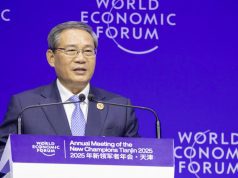International Monetary Fund Projects China GDP to Increase +5% in 2024 & +4.5% in 2025, Revised Upwards by 0.4% for Both 2024 & 2025
30th May 2024 | Hong Kong
International Monetary Fund (IMF) in the latest 2024 China Article IV Consultation, is prrojecting China GDP to increase +5% in 2024 and +4.5% in 2025, revised upwards by 0.4% for both 2024 & 2025. IMF First Deputy Managing Director, Gita Gopinath: “China’s economic development over the past few decades has been remarkable, driven by market-oriented reforms, trade liberalization and integration into global supply chains. However, these achievements have been accompanied by imbalances and headwinds to growth have emerged. The authorities recognize these challenges and are focused on achieving high quality growth. In our view, a more comprehensive policy approach would help China navigate the headwinds facing the economy. I would like to highlight a few messages from the mission. First, we project China’s economy to grow by 5 percent in 2024 and 4.5 percent in 2025. These reflect upward revisions of 0.4 percentage points for both the years compared to the April world economic outlook projections, and it’s driven by a strong first quarter GDP growth in 2024 and recent policy measures. Inflation is expected to rise but stay low as output remains below potential. Core inflation is projected to increase only gradually to average around 1 percent in 2024. Over the medium-term, growth is expected to slow to 3.3 percent due to aging demographics and slower productivity growth. Overall risks to the outlook are tilted to the downside, including from a greater or longer than expected property sector adjustment and increasing fragmentation pressures. Second, the ongoing housing market correction, which is necessary for steering the sector towards a more sustainable path, must continue. The authorities have implemented various welcome measures to guide the property market transition, including recent policy announcements regarding lending support for affordable housing. We see scope for a more comprehensive policy package to address property sector issues. Importantly, central government resources should be deployed to help homebuyers of pre-sold unfinished homes. This will also pave the way for exit of insolvent developers from the property market. Allowing for greater price flexibility can further stimulate housing demand and help restore equilibrium. Third, near-term macroeconomic policies should be geared to support domestic demand and mitigate downside risks. Fiscal policy should prioritize providing one off central government financial support for the real estate sector. Excluding this one-time property sector package, a neutral fiscal stance in 2024 would balance tradeoffs between supporting domestic demand, mitigating deflation risks, and managing unfavorable debt dynamics. The monetary policy easing implemented so far in 2024 is welcome, but given that inflation remains subdued and output is below potential, there is scope for further easing. Greater exchange rate flexibility would reduce deflation risks and help absorb external shocks. China faces significant fiscal challenges, especially for local governments. Sustained fiscal consolidation over the medium-term is needed to stabilise debt. Restructuring the unsustainable debt of local government, financing vehicles can help reduce fiscal strength. To tackle elevated financial stability risks, the authorities have appropriately focused on addressing vulnerabilities in the property sector, in local government finances, and in smaller financial institutions. Strengthening the Bank resolution framework and strictly applying credential standards will help enhance financial stability and mitigate risk. Fourth, achieving high quality growth will require structural reforms. Key priorities include rebalancing the economy towards consumption by strengthening the social safety net and liberalizing the services sector to enable it to boost growth and create jobs. Fifth, China’s use of policies to support priority sectors can potentially lead to a misallocation of domestic resources and also potentially affect trading partners. Scaling back such policies and removing trade and investment restrictions will raise domestic productivity and ease fragmentation pressures. In this context, China should continue its efforts to strengthen the multilateral trading system, particularly the World Trade Organization. China plays an important and constructive role in supporting debt restructuring in low-income countries and promoting the green transition. The Fund looks forward to our continued cooperation with the authorities in this regard.
“ International Monetary Fund Projects China GDP to Increase +5% in 2024 & +4.5% in 2025, Revised Upwards by 0.4% for Both 2024 & 2025 “
International Monetary Fund Projects China GDP to Increase +5% in 2024 & +4.5% in 2025, Revised Upwards by 0.4% for Both 2024 & 2025

Sign Up / Register
Caproasia Users
- Manage $20 million to $3 billion of assets
- Invest $3 million to $300 million
- Advise institutions, billionaires, UHNWs & HNWs
Caproasia Platforms | 11,000 Investors & Advisors
- Caproasia.com
- Caproasia Access
- Caproasia Events
- The Financial Centre | Find Services
- Membership
- Family Office Circle
- Professional Investor Circle
- Investor Relations Network
Monthly Roundtable & Networking
Family Office Programs
The 2025 Investment Day
- March - Hong Kong
- March - Singapore
- July - Hong Kong
- July - Singapore
- Sept- Hong Kong
- Sept - Singapore
- Oct- Hong Kong
- Nov - Singapore
- Visit: The Investment Day | Register: Click here
Caproasia Summits
- The Institutional Investor Summit
- The Investment / Alternatives Summit
- The Private Wealth Summit
- The Family Office Summit
- The CEO & Entrepreneur Summit
- The Capital Markets Summit
- The ESG / Sustainable Investment Summit


































